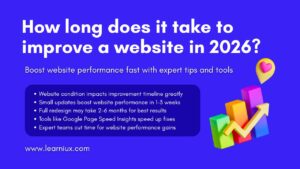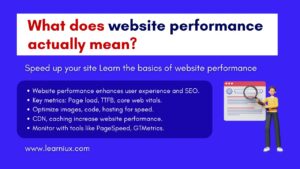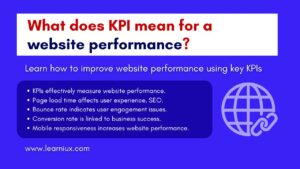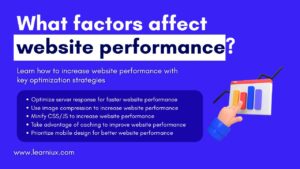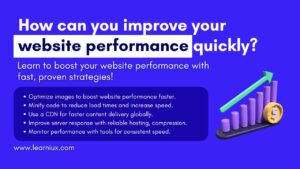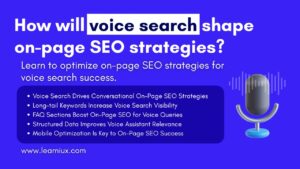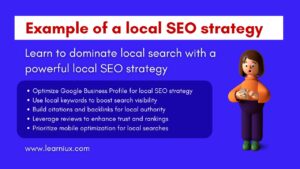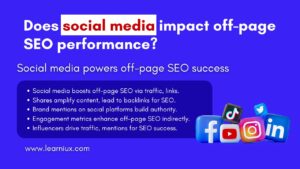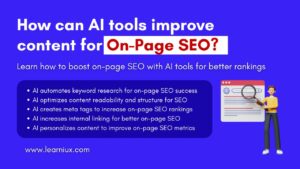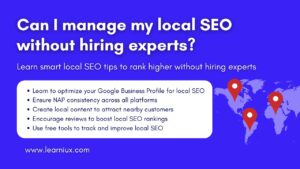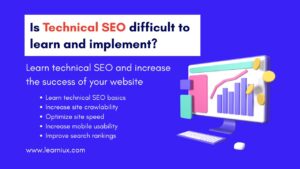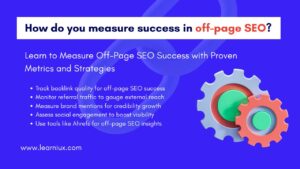Search engine optimization is a cornerstone of digital marketing, helping websites climb the ranks of search engines like Google to attract more visitors. At its core, SEO is divided into two main approaches, on-page SEO and off-page SEO, each with different methods for increasing a website’s visibility. To determine whether on-page SEO or off-page SEO works better, it’s important to understand their unique strengths, how they complement each other, and how they align with your website’s goals. This exploration delves deep into both strategies, comparing their effectiveness, benefits, and practical applications to help you make informed decisions for your online presence.
On-page SEO involves optimizing the direct elements of your website to improve its search engine rankings. It’s about fine-tuning what you control, from content to technical aspects. The primary focus is on creating high-quality content that your audience will love. Content that answers user questions, provides value, and includes keywords like on-page SEO or off-page SEO naturally ranks higher. For example, a blog post explaining SEO strategies can engage readers while signaling relevance to search engines. Beyond content, keyword optimization plays a key role. Strategically placing keywords in titles, meta descriptions, headings, and throughout the text ensures that search engines understand the purpose of your page. Tools like Google Keyword Planner or Ahrefs can help identify high-volume terms that match what users are searching for, such as on-page SEO or off-page SEO.
Technical SEO is another important aspect of on-page optimization. This includes improving site speed, ensuring mobile responsiveness, and creating a clean URL structure. A website that loads quickly and displays well on smartphones enhances the user experience, which search engines prioritize. For example, Google’s Core Web Vitals emphasizes metrics like loading speed and visual consistency, which directly impact rankings. Internal linking also falls under on-page SEO, helping users navigate your site and keeping them engaged for longer. By linking to related articles or pages, you create a web of content that search engines can crawl efficiently, increasing the relevance of your site. For example, linking to a guide on on-page SEO or off-page SEO in your blog can guide users to explore more of your content.
The benefits of on-page SEO are numerous. Since you control your website, you can implement changes quickly without relying on external parties. Optimizing meta descriptions or changing headlines can lead to rapid improvements in rankings. It is also cost-effective, requiring mainly time and the use of basic tools such as a content management system or SEO plugins. For small businesses or new websites, on-page SEO provides a way to compete without a significant financial investment. A well-optimized page containing keywords, such as on-page SEO or off-page SEO, can attract organic traffic faster than waiting for external links to build authority. However, on-page SEO requires ongoing effort. Search engine algorithms evolve, and staying up to date with trends like voice search optimization or AI-driven content ranking is essential to maintaining results.
In contrast, off-page SEO focuses on external actions to increase the authority and credibility of your website. It’s about building your site’s reputation in the digital ecosystem. The most prominent off-page strategy is backlink building. When reputable websites link to your content, search engines see your site as trustworthy, boosting its rankings. Quality is more important than quantity here. A single backlink from a high-authority site, like a major news outlet, can be worth more than dozens of links from lower-ranking directories. For example, a backlink from a reputable marketing blog to your on-page SEO or off-page SEO guide can significantly increase your site’s credibility.
Social media engagement is another important off-page SEO tactic. Platforms like X, Instagram, or LinkedIn allow you to share content, interact with your audience, and drive traffic to your site. For example, posting about on-page SEO or off-page SEO on X can attract clicks and increase brand visibility. While social media links don’t directly impact rankings, they do increase your reach and create opportunities for others to link to your content. Guest posting is also effective, allowing you to publish articles on other websites in your niche. This not only earns backlinks, but also exposes your brand to a new audience. For example, writing a guest post about on-page SEO or off-page SEO for a digital marketing blog can position you as an expert while driving traffic back to your site.
Online reputation management is also tied to off-page SEO. Positive reviews, brand mentions, and citations on platforms like Google My Business or industry forums increase your site’s credibility. Interacting with your audience on X or responding to reviews shows search engines that your brand is active and valuable. The benefits of off-page SEO lie in its ability to build long-term authority. Unlike on-page SEO, which offers quick wins, off-page efforts build a foundation of credibility that sustains rankings over time. A site with strong backlinks and consistent mentions is seen as a trusted resource, making it harder for competitors to rank higher than you.
Comparing on-page SEO and off-page SEO reveals the difference in the trade-offs. On-page SEO delivers faster results because you can implement changes directly. Updating page content or fixing technical issues can boost rankings immediately. However, off-page SEO takes time. Building backlinks or increasing your social media presence requires patience and outreach, but the results are often more sustainable. For example, high-quality backlinks can drive authority for years, while on-page optimization requires regular updates to remain effective. Control is another factor. On-page SEO gives you complete control over your site, from editing content to adjusting code. Off-page SEO relies on external factors, such as other websites or social platforms, which can be unpredictable. A website might remove your backlinks, or a social media algorithm change could reduce your reach.
Cost is an important consideration. On-page SEO is usually more affordable, requiring only your time or the use of tools like Yoast SEO or SEMrush. Off-page SEO can involve costs like paying for guest post placements or running social media ad campaigns. However, free methods like organic outreach or engaging on X can reduce costs. In terms of impact, on-page SEO lays the foundation for a user-friendly, search-optimized site, while off-page SEO increases its authority. A site with poor on-page SEO but strong backlinks may initially rank well but struggle to retain users due to poor content or slow loading times. Conversely, a well-optimized site without backlinks may rank lower than competitors with strong off-page signals.
The question of whether to use on-page SEO or off-page SEO depends on your website’s current status and goals. On-page SEO is most beneficial for new websites. If your site lacks quality content, has slow loading times, or is not mobile-friendly, it’s important to address these issues first. For example, optimizing blog posts with keywords such as on-page SEO or off-page SEO and ensuring fast loading times can quickly improve user experience and rankings. Established websites with solid on-page optimization should focus on off-page SEO to build authority. Getting backlinks from industry leaders or increasing brand mentions on platforms like X can help your site rank higher in search results.
In reality, combining both strategies yields the best results. A balanced approach ensures that your site is both user-friendly and authoritative. Start with on-page SEO to build a strong foundation. Write engaging content, optimize for keywords like on-page SEO or off-page SEO, and make sure technical elements like site speed are top-notch. Then, shift to off-page SEO to build credibility. Reach out to bloggers for guest posting opportunities, engage with your audience on social media, and find high-quality backlinks. Monitor performance regularly using tools like Google Analytics or Search Console to identify what’s working and where adjustments are needed. For example, if you’re seeing low engagement despite strong rankings, your on-page SEO may need better content to retain users. If rankings are stagnant despite great content, off-page SEO efforts like backlink building may be the missing piece.
Real-world examples highlight the interplay between the two strategies. Consider a small e-commerce site that sells eco-friendly products. By optimizing product descriptions with relevant keywords and ensuring a mobile-friendly design, the site improves its on-page SEO, attracting more organic traffic. At the same time, collaborating with sustainability bloggers for backlinks and sharing content on X increases its off-page SEO, increasing its authority. Over time, this dual approach helps the site outperform competitors. Similarly, a personal blog about digital marketing can use on-page SEO to create in-depth guides on topics such as on-page SEO or off-page SEO, while off-page efforts such as guest posting on industry sites increase its reputation.
Both approaches have challenges. On-page SEO requires staying up-to-date with algorithm changes, such as Google’s focus on user experience metrics. Over-optimizing for keywords can also lead to penalties, making natural integration important. Off-page SEO faces obstacles like securing high-quality backlinks in a competitive field or managing negative reviews that can damage your reputation. Both require time and consistency. A common mistake is to prioritize one over the other. Neglecting on-page SEO can make your site difficult to navigate, while neglecting off-page SEO limits your site’s authority. These dangers can be avoided by striking a balance.
Emerging trends are impacting both strategies in 2025. Search engines are increasingly placing importance on user intent, rewarding sites that deliver relevant, high-quality content. On-page SEO should adapt by focusing on meaningful search, using relevant keywords, and providing direct answers to user questions. For example, a page about on-page SEO or off-page SEO should address specific questions like “how to optimize a website” or “why backlinks are important.” Off-page SEO is evolving with the rise of AI-driven content and social signals. Engaging on platforms like X, where real-time conversations shape brand perceptions, is more important than ever. AI tools like voice search and chatbots are also impacting SEO, requiring content to be conversational and optimized for natural language queries.
The data supports the effectiveness of both strategies. Studies show that sites with strong on-page SEO, such as fast load times and keyword-rich content, rank higher for competitive terms. Meanwhile, backlinks are a top ranking factor, with sites with more high-quality links consistently outperforming others. For example, a 2023 Ahrefs study found that pages with backlinks from authoritative domains rank significantly higher than pages without. Combining both approaches maximizes these benefits, as a site with great content and strong backlinks attracts users and search engines alike.
The choice between on-page SEO and off-page SEO is not binary. The two are like two sides of the same coin. On-page SEO ensures that your site is accessible, relevant, and user-friendly, while off-page SEO builds its reputation and credibility. For most websites, starting with on-page optimization builds a strong foundation, followed by off-page efforts to increase reach. Small businesses may prioritize on-page SEO to establish a presence, while larger brands with existing content may invest in off-page SEO to dominate their niche. Regularly auditing your site’s performance and adapting to search engine updates will keep both strategies effective.
Ultimately, neither on-page SEO nor off-page SEO is inherently better. Their effectiveness depends on your website’s needs, resources, and long-term goals. New sites benefit from on-page SEO to create a user-friendly experience, while established sites benefit from off-page SEO to build authority. The most successful SEO campaigns combine both, using high-quality content, technical optimization, backlinks, and social engagement. By strategically focusing on keywords like on-page SEO or off-page SEO and monitoring the results, you can achieve sustainable growth in search rankings and traffic. In an ever-evolving digital landscape, a balanced approach ensures that your website thrives.






















